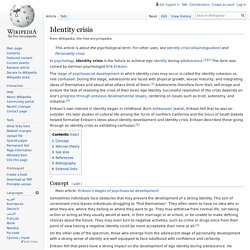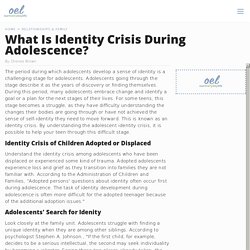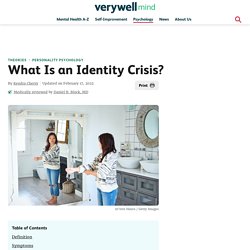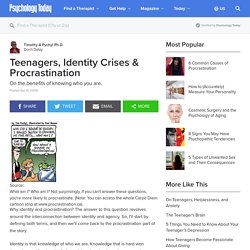

Identity crisis. In psychology, identity crisis is the failure to achieve ego identity during adolescence.[1][2] The term was coined by German psychologist Erik Erikson.

The stage of psychosocial development in which identity crisis may occur is called the identity cohesion vs. role confusion. During this stage, adolescents are faced with physical growth, sexual maturity, and integrating ideas of themselves and about what others think of them.[3] Adolescents therefore form their self-image and endure the task of resolving the crisis of their basic ego identity. Successful resolution of the crisis depends on one's progress through previous developmental stages, centering on issues such as trust, autonomy, and initiative.[3] Erikson's own interest in identity began in childhood. Born Ashkenazic Jewish, Erikson felt that he was an outsider.
Concept[edit] Sometimes individuals face obstacles that may prevent the development of a strong identity. Marcian theory[edit] See also[edit] References[edit] What Is Identity Crisis During Adolescence? The period during which adolescents develop a sense of identity is a challenging stage for adolescents.

Adolescents going through the stage describe it as the years of discovery or finding themselves. During this period, many adolescents embrace change and identify a goal or a plan for the next stages of their lives. For some teens, this stage becomes a struggle, as they have difficulty understanding the changes their bodies are going through or have not achieved the sense of self-identity they need to move forward.
What It Means to Be Having an Identity Crisis. You have probably heard the term "identity crisis" before and you probably have a fairly good idea of what it means.

But where did this idea originate? Why do people experience this kind of personal crisis? Is it something confined to the teenage years? The concept originates in the work of developmental psychologist Erik Erikson, who believed that the formation of identity was one of the most important parts of a person's life. How Do Teens Form Their Identity? — Exploring your mind. Adolescence is the period from the beginning of puberty (13 or 14 years old) to age 18.

People usually think of it as a difficult stage, but many people go through adolescence without any problems. Teenagers, Identity Crises & Procrastination. Source: article continues after advertisementWhat am I?

Who am I? Not surprisingly, if you can't answer these questions, you're more likely to procrastinate. (Note: You can access the whole Carpe Diem cartoon strip at www.procrastination.ca). Your Teen's Search for Identity. Their bodies kick into overdrive.

They find themselves disoriented, scared and alone. They become moody, secretive and sarcastic. You don’t recognize your own child. What happened to the child you used to know? The answer: adolescence. In the teenage years, young people begin their quests for identity. How to Help Teens with an Identity Crisis – Hammond Psychology & Associates, P.A. Webster defines an identity crisis as “a feeling of unhappiness and confusion caused by not being sure about what type of person you really are or what the true purpose of your life is.”

Although an identity crisis can occur at any age, they are supremely important to address in the teen years because of the profound affect they can have that carries on into adulthood. What makes an identity crisis so intense in the teenage years is that these are the years teens are already going through significant and confusing changes. Puberty is hitting, hormones are raging, school work is getting more demanding and extracurricular activities are becoming more frequent. Calming the Identity Crisis: Tips for Parents of Teens with Identity Issues - Solstice East. Six Ways to Build Your Teen's Identity - Focus on the Family. Español DONATEStrengthen families withyour gift GIVE MONTHLYHelp fund our ministryprograms Menu Search.

How to better understand your teenage child. Do you ever feel like your teenager is from another planet?

They speak a language you don’t understand. They have interests that you’ve never heard of. It’s a common phenomenon. Teenagers are weird. That being said, they’re your teenagers and there are steps you can take to better understand them and be closer. 1. The first step to understanding your teen is to ask questions, but be strategic about it. 2. 3. 12 Essential Tips for Positive Parenting Your Teen!herishing your Baby. Positive parenting a teenager?

A terrific teen who's responsible, considerate, shows good judgment, at least most of the time? Yes, it is possible! Here's your game plan, with 12 essential Tips. You may not feel like you have much influence on your child these days, but teens’ behavior is highly correlated with the strength of their bonds with their parents. Good relationships between teenagers and their parents, as rated by both, are positively correlated with school success and general happiness as rated by the teen, and also by those around her. By contrast, weak or conflictual parent/teen relationships are correlated with early sexual activity, experimentation with drugs and alcohol, the teen's involvement in violence (as either perpetrator or victim), and suicide.